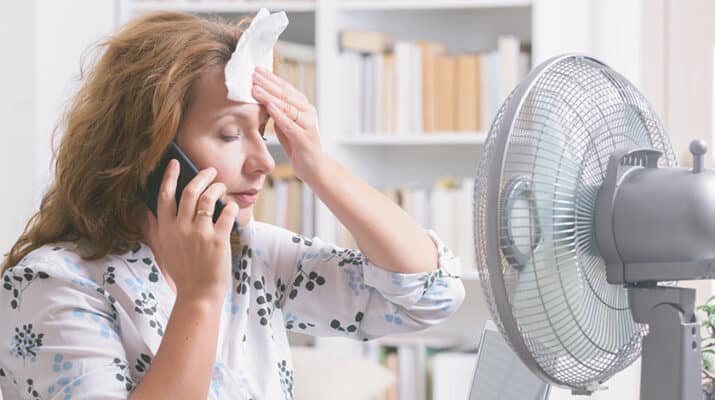By Deborah Jeanne Sergeant
 As of June 1, the FDA approved the first drug in its class to treat menopausal hot flashes. Veozah (fezolinetant) is an oral medication indicated for moderate to severe hot flashes.
As of June 1, the FDA approved the first drug in its class to treat menopausal hot flashes. Veozah (fezolinetant) is an oral medication indicated for moderate to severe hot flashes.
Although hormone therapy is well-tolerated for some women, others do not want it or cannot have it. Hormone therapy has been linked with an increased risk of breast cancer and cardiovascular disease.
“It is good to have a non-estrogen product for women,” said pharmacist Sarah Driscoll, pharmacy operations supervisor at Oswego Health.
Veozah is a different class of medication than previous drugs used to treat hot flashes. It works by interrupting the pathways in the brain related to hot flashes, which is a different mechanism for reducing hot flashes than other prescription drugs. During its trial by week one those taking Veozah experience a 50% reduction of hot flashes and that continues to improve by week 12. The diversity of the trial, both in the ethnicity and BMI of the participants, bodes for a much broader efficacy than trials that include fewer types of women.
“Since it’s metabolized by the liver, if you have liver dysfunction, it’s probably not best for that patient,” Driscoll said.
Patients’ liver function is monitored every three months for the first year they use Veozah for this reason. Patients will need to shoulder these costs.
She added that side effects could include nausea, vomiting, and, because of liver dysfunction, yellowing of the eyes and skin. Veozah is contraindicated for women with liver disease or liver problems.
“It’s a conversation patients should have before starting it,” Driscoll said. “If patients have cirrhosis of the liver or end-stage renal disease, they should not take it.”
Sleepiness is another side effect of Veozah. However, many menopausal women struggle with sleep, so most women do not find that bothersome if they take their dose in the evening. Some women experience nausea and gastrointestinal upset.
The medication should be a “tier 2” medication, indicating that most insurance will cover it with a moderate co-pay for patients. But if it is out-of-pocket, it could cost up to $600 per month. Driscoll said that would be a barrier for many women.
Keila Muniz, urogynecologist with St. Joseph’s Health, said that she offers menopausal patients numerous strategies for dealing with hot flashes, including using air conditioning and fans and dressing in layers to tame the heat. Some non-hormonal medication may help, like selective serotonin reuptake inhibitors.
“These are used for depression but in low doses are good for just hot flashes,” Muniz said. “It’s a pleasant surprise when patients say that they didn’t know that would help.”
SSRI medication offers dual use. The North American Menopausal Society states on its website that women going through menopause are especially prone to depression and that they experience double the rate of depression of younger women.

